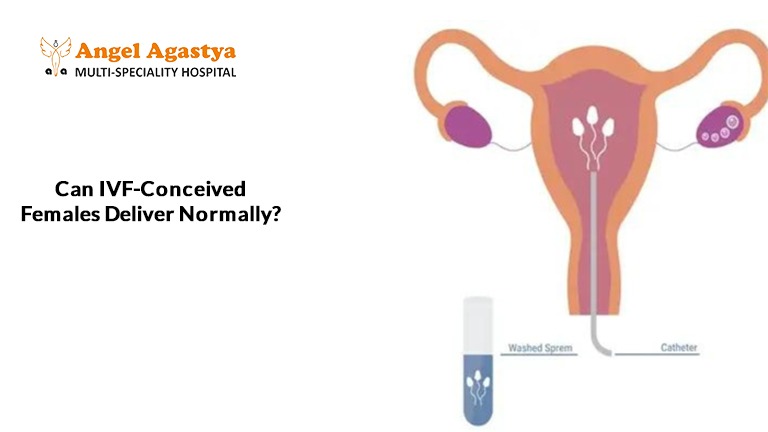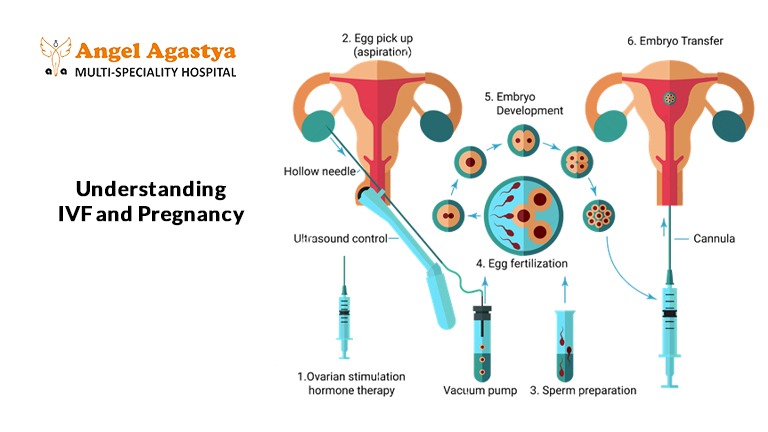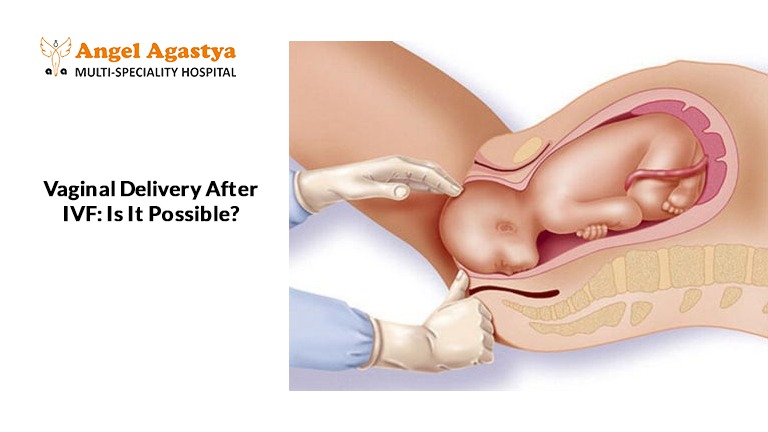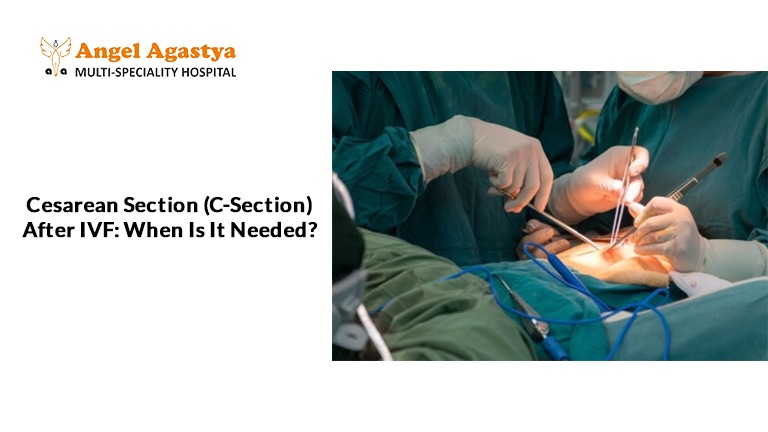Can IVF-Conceived Females Deliver Normally?

If you’ve conceived through IVF, you might be wondering, “Can I still have a normal vaginal birth?” The good news? IVF Delivery can absolutely be natural for many women. With the right medical support and a healthy pregnancy, vaginal birth is not only possible—but often preferred. Let’s explore the facts, clear the doubts, and empower your IVF journey with clarity and confidence.
INTRODUCTION
The journey to parenthood through In Vitro Fertilization (IVF) is both exciting and challenging. While IVF helps many couples overcome infertility, those who conceive through this process often have questions about pregnancy, labor, and delivery.
Many women wonder whether an IVF pregnancy differs from a natural conception in terms of risks, delivery options (vaginal birth vs. C-section), and overall pregnancy experience. While most IVF pregnancies progress normally, factors like maternal age, multiple pregnancies (twins or more), and underlying fertility issues may influence the delivery process.
Consulting with a specialist can help you understand what to expect and how to ensure a healthy pregnancy and safe delivery. A common question that arises is:
Can women who conceive through IVF deliver normally (vaginally)?
The reassuring answer is yes, in many cases. IVF conception itself does not automatically mean a cesarean section (C-section) is necessary. However, several factors related to IVF pregnancies and the individual’s health can influence the mode of delivery.
Understanding IVF and Pregnancy

In Vitro Fertilization (IVF) is an assisted reproductive technology (ART) where eggs are collected from a woman’s ovaries and fertilized with sperm in a lab. The fertilized embryos are then transferred into the uterus to help achieve pregnancy.
Although IVF babies develop just like naturally conceived babies, certain factors can influence how they are delivered. Multiple pregnancies, maternal health conditions, and pregnancy complications can affect whether a vaginal or surgical IVF Delivery is safer.
Doctors carefully monitor IVF Delivery cases to ensure both mother and baby remain healthy. Factors like baby’s position, size, and overall pregnancy health help determine the best IVF Delivery method. While many IVF pregnancies result in normal deliveries, some require extra care.
Thanks to medical advancements and proper prenatal care, IVF Delivery offers a successful path to parenthood for many couples struggling with infertility.
Factors Influencing Delivery Method

Whether an IVF Delivery results in a vaginal birth or a C-section depends on medical factors, similar to natural conceptions.
- Baby’s Position: If the baby is head-down, vaginal IVF Delivery is often safe. Breech or transverse positions usually require a C-section.
- Baby’s Size: Larger babies can complicate vaginal IVF Delivery, especially with smaller maternal pelvic size.
- Mother’s Health: Conditions like high blood pressure or prior surgeries affect IVF Delivery choices.
- Pregnancy Complications: Placenta previa, preeclampsia, or fetal distress may make C-section a safer IVF Delivery option.
- Multiple Gestation: Twin pregnancies through IVF often lead to planned surgical IVF Delivery for safety.
Vaginal Delivery After IVF: Is It Possible?

Yes! Many women can have a vaginal IVF delivery , especially if there are no medical complications. Doctors usually recommend vaginal birth when the pregnancy progresses smoothly, and the baby is in the correct position.
Benefits of Vaginal Delivery for IVF Mothers
- Faster Recovery – Mothers recover quicker compared to a C-section, allowing them to resume normal activities sooner.
- Lower Risk of Surgical Complications – Vaginal birth avoids risks like infection, excessive bleeding, and anesthesia-related complications.
- Better Baby Immunity – Babies born vaginally receive beneficial gut bacteria, which help strengthen their immune system.
- Easier Future Pregnancies – A vaginal birth increases the chances of delivering vaginally in future pregnancies, reducing the need for repeat C-sections.
If you are pregnant through IVF, discuss delivery options with your doctor to determine the safest and best method for you and your baby.
Cesarean Section (C-Section) After IVF: When Is It Needed?

Many women who conceive through IVF can have a normal vaginal delivery. However, in some cases, a C-section may be the safer option for both the mother and baby. The decision depends on several IVF Delivery -related risks.
Common Reasons for C-Section in IVF Delivery:
- Multiple Pregnancies – Women carrying twins, triplets, or more have a higher chance of needing a C-section. The risk of complications increases with multiple babies, making surgery a safer option in many cases.
- Breech or Transverse Position – If the baby is not head-down, a vaginal delivery can be difficult or risky. A C-section may be needed if the baby remains in an incorrect position close to delivery.
- Fetal Distress – If the baby’s heart rate drops or there are signs of distress during labor, an urgent C-section may be necessary to ensure a safe birth.
- Placenta Previa or Other Placental Issues – A low-lying placenta (placenta previa) can block the birth canal, making vaginal delivery unsafe.
- Maternal Health Issues – Conditions like high blood pressure, gestational diabetes, or previous C-section scars can increase the need for a surgical birth.
Planned vs. Emergency C-Section
- Planned C-Section IVF Delivery – Scheduled in advance when doctors identify risk factors that make vaginal delivery unsafe.
- Emergency C-Section – Performed suddenly if unexpected complications arise during labor.
If you are pregnant through IVF, discuss delivery options with your doctor early to ensure a safe and smooth childbirth experience.
Making the Right Decision: Vaginal or C-Section?
Choosing the right delivery method for an IVF Delivery is an important decision that involves the expectant mother, her partner, and the healthcare provider. The decision depends on medical conditions, the baby’s position, and the mother’s comfort and health.
Factors to Consider:
- Doctor’s Advice – Your OB-GYN will assess your health and the progress of your pregnancy. If there are any complications, they may recommend a specific delivery method for the safety of both you and the baby.
- Baby’s Position and Growth – If the baby is in a head-down position and there are no complications, a vaginal birth is usually preferred. However, if the baby is in a breech or transverse position, a C-section may be necessary.
- Personal Comfort and Health – Some mothers may choose a C-section due to medical conditions, previous birth trauma, or concerns about labor pain. It is important to discuss all options with your doctor to make the best choice for your well-being.
Planning ahead ensures a smoother IVF Delivery experience
Talk to your doctor early in pregnancy about the risks and benefits of both vaginal birth and C-section. A well-informed decision ensures the safest and most comfortable birth experience for both mother and baby.
Conclusion
Many women who conceive through IVF can experience a vaginal IVF Delivery without complications. In fact, vaginal birth is often preferred because it has a shorter recovery time.
However, in some cases, factors like multiple pregnancies, fetal distress, or placenta issues may require a C-section for the safety of both mother and baby.
Key Takeaways:
- Stay informed and work closely with your doctor throughout your pregnancy.
- Listen to your body and report any unusual symptoms early.
- Plan ahead to ensure a smooth and safe delivery, whether vaginal or C-section.
Every pregnancy is different, and the best delivery method is the one that ensures the health and safety of both mother and baby. If you are pregnant through IVF, discuss your concerns with your doctor early to make the best decision for your delivery.
FAQs on IVF Delivery
1. Can an IVF pregnancy be delivered normally?
Yes, many IVF pregnancies result in normal vaginal delivery if there are no medical complications. Doctors assess the baby’s position, size, and overall pregnancy health to determine if a vaginal birth is safe.
2. Is a C-section mandatory for IVF-conceived babies?
No. IVF itself does not require a C-section. However, certain medical conditions like placenta previa, breech presentation, or multiple pregnancies may make a C-section necessary. The decision depends on individual pregnancy factors.
3. Does IVF increase the risk of preterm birth?
IVF pregnancies have a slightly higher chance of preterm birth (before 37 weeks), but many IVF mothers carry their babies to full term. Proper prenatal care, regular check-ups, and a healthy lifestyle can help reduce this risk.
4. Can I try for a vaginal birth after a previous C-section?
Yes! Vaginal Birth After Cesarean (VBAC) is possible if your doctor approves and you have a low-risk pregnancy. Factors such as uterine health and the reason for the previous C-section will be considered before allowing a VBAC attempt.
5. Do IVF babies require special neonatal care?
Most IVF babies are completely healthy and do not need special care. However, if the baby is born prematurely or if there were complications during pregnancy, additional neonatal care may be required.
6. Are twin pregnancies from IVF always delivered by C-section?
Not always. If both babies are in a head-down (vertex) position, vaginal birth may be possible. However, doctors often recommend a C-section for twin or triplet pregnancies to minimize risks to both mother and babies.
7. Does IVF increase the risk of pregnancy complications?
Certain risks, such as placental issues, preeclampsia, or gestational diabetes, are slightly higher in IVF pregnancies. However, with good prenatal care and monitoring, these risks can be managed effectively.
8. Is recovery from a C-section after IVF different from normal pregnancies?
Recovery from a C-section is the same for IVF and non-IVF pregnancies. It typically takes 4-6 weeks to heal completely. Following post-surgical care instructions helps ensure a smooth recovery.
9. Can I plan for a home birth after IVF?
Doctors usually recommend hospital deliveries for IVF pregnancies due to slightly higher risk factors. A hospital setting ensures quick medical intervention if needed.
10. Does IVF affect future pregnancies?
IVF does not negatively impact future pregnancies. However, factors like maternal age, uterine health, and overall medical history play a role in future pregnancy success.

